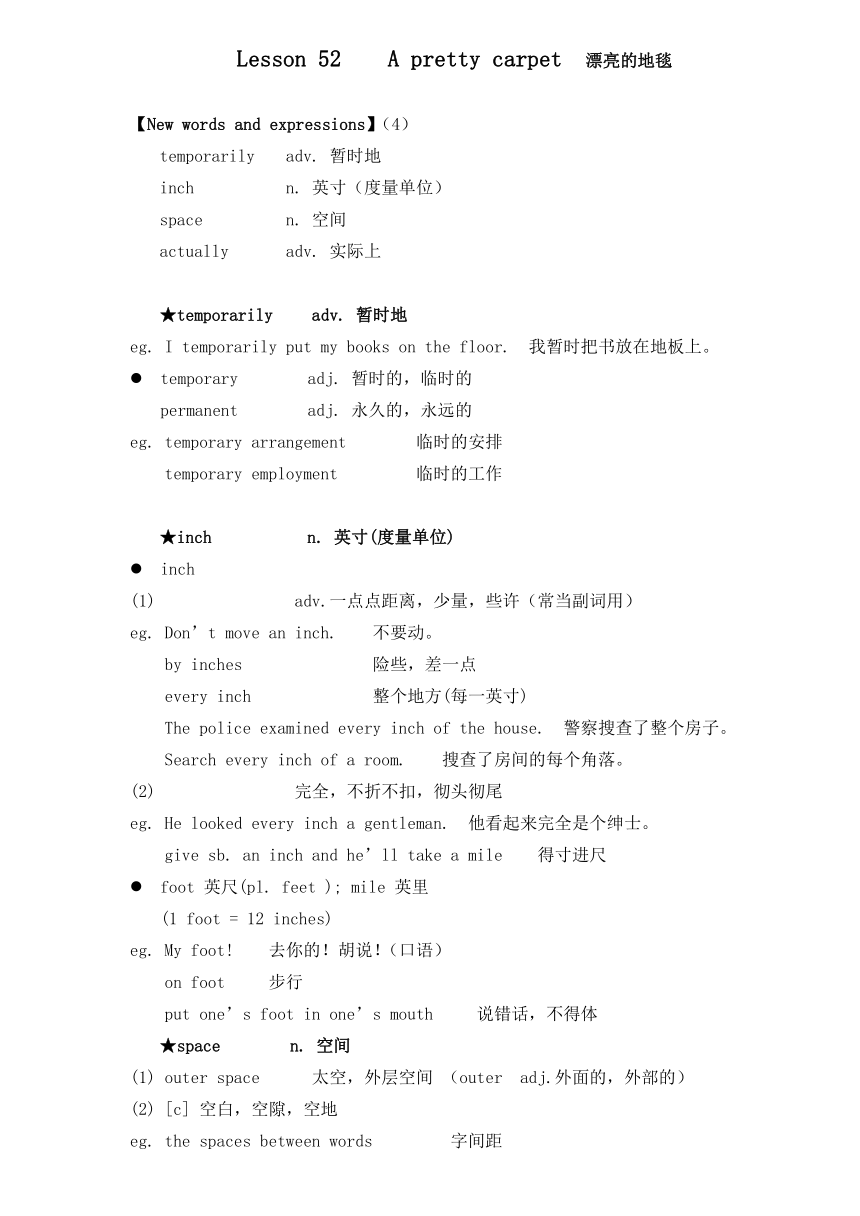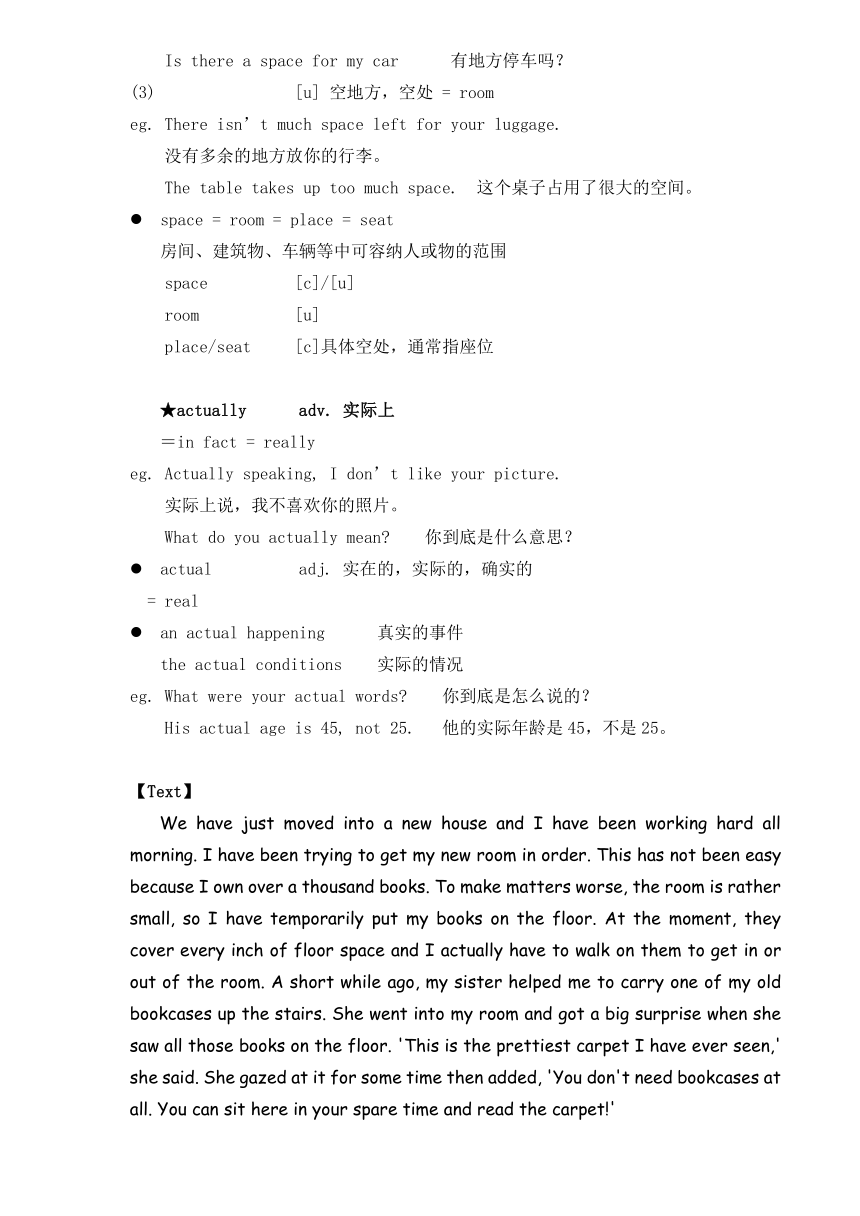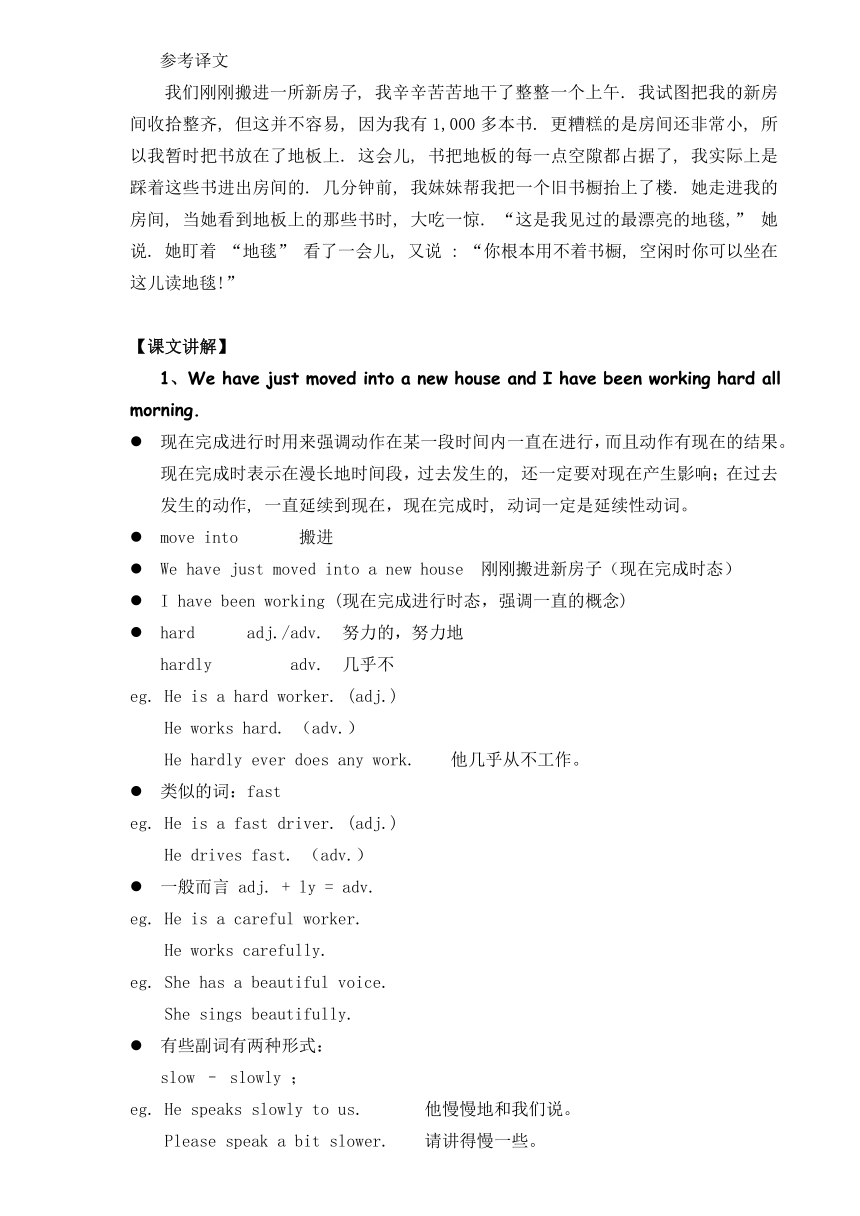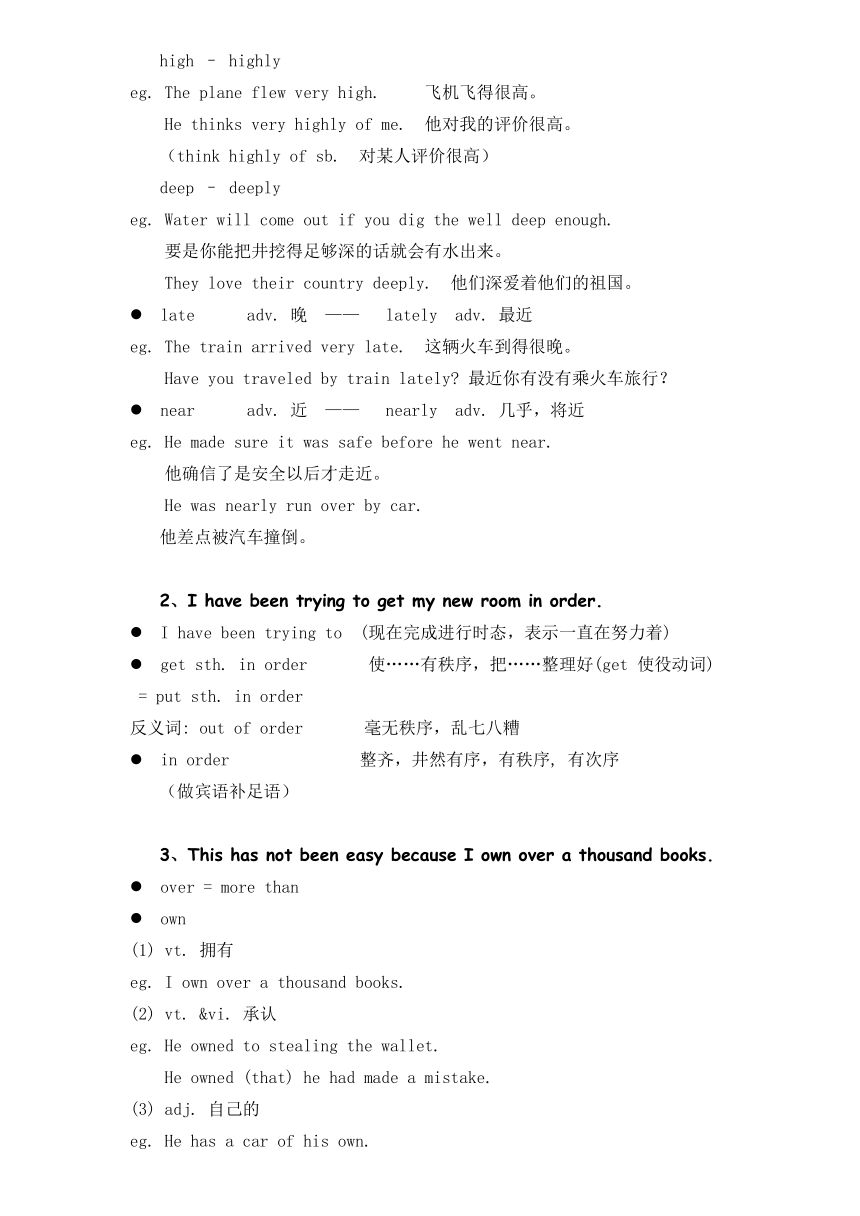新概念英语二册超详教案讲义笔记Lesson 52 A pretty carpet 漂亮的地毯
文档属性
| 名称 | 新概念英语二册超详教案讲义笔记Lesson 52 A pretty carpet 漂亮的地毯 |  | |
| 格式 | docx | ||
| 文件大小 | 32.4KB | ||
| 资源类型 | 教案 | ||
| 版本资源 | 新概念英语 | ||
| 科目 | 英语 | ||
| 更新时间 | 2023-09-26 07:00:42 | ||
图片预览




文档简介
Lesson 52 A pretty carpet 漂亮的地毯
【New words and expressions】(4)
temporarily adv. 暂时地
inch n. 英寸(度量单位)
space n. 空间
actually adv. 实际上
★temporarily adv. 暂时地
eg. I temporarily put my books on the floor. 我暂时把书放在地板上。
temporary adj. 暂时的,临时的
permanent adj. 永久的,永远的
eg. temporary arrangement 临时的安排
temporary employment 临时的工作
★inch n. 英寸(度量单位)
inch
adv.一点点距离,少量,些许(常当副词用)
eg. Don’t move an inch. 不要动。
by inches 险些,差一点
every inch 整个地方(每一英寸)
The police examined every inch of the house. 警察搜查了整个房子。
Search every inch of a room. 搜查了房间的每个角落。
完全,不折不扣,彻头彻尾
eg. He looked every inch a gentleman. 他看起来完全是个绅士。
give sb. an inch and he’ll take a mile 得寸进尺
foot 英尺(pl. feet ); mile 英里
(1 foot = 12 inches)
eg. My foot! 去你的!胡说!(口语)
on foot 步行
put one’s foot in one’s mouth 说错话,不得体
★space n. 空间
(1) outer space 太空,外层空间 (outer adj.外面的,外部的)
(2) [c] 空白,空隙,空地
eg. the spaces between words 字间距
Is there a space for my car 有地方停车吗?
[u] 空地方,空处 = room
eg. There isn’t much space left for your luggage.
没有多余的地方放你的行李。
The table takes up too much space. 这个桌子占用了很大的空间。
space = room = place = seat
房间、建筑物、车辆等中可容纳人或物的范围
space [c]/[u]
room [u]
place/seat [c]具体空处,通常指座位
★actually adv. 实际上
=in fact = really
eg. Actually speaking, I don’t like your picture.
实际上说,我不喜欢你的照片。
What do you actually mean 你到底是什么意思?
actual adj. 实在的,实际的,确实的
= real
an actual happening 真实的事件
the actual conditions 实际的情况
eg. What were your actual words 你到底是怎么说的?
His actual age is 45, not 25. 他的实际年龄是45,不是25。
【Text】
We have just moved into a new house and I have been working hard all morning. I have been trying to get my new room in order. This has not been easy because I own over a thousand books. To make matters worse, the room is rather small, so I have temporarily put my books on the floor. At the moment, they cover every inch of floor space and I actually have to walk on them to get in or out of the room. A short while ago, my sister helped me to carry one of my old bookcases up the stairs. She went into my room and got a big surprise when she saw all those books on the floor. 'This is the prettiest carpet I have ever seen,' she said. She gazed at it for some time then added, 'You don't need bookcases at all. You can sit here in your spare time and read the carpet!'
参考译文
我们刚刚搬进一所新房子, 我辛辛苦苦地干了整整一个上午. 我试图把我的新房间收拾整齐, 但这并不容易, 因为我有1,000多本书. 更糟糕的是房间还非常小, 所以我暂时把书放在了地板上. 这会儿, 书把地板的每一点空隙都占据了, 我实际上是踩着这些书进出房间的. 几分钟前, 我妹妹帮我把一个旧书橱抬上了楼. 她走进我的房间, 当她看到地板上的那些书时, 大吃一惊. “这是我见过的最漂亮的地毯,” 她说. 她盯着 “地毯” 看了一会儿, 又说 : “你根本用不着书橱, 空闲时你可以坐在这儿读地毯!”
【课文讲解】
1、We have just moved into a new house and I have been working hard all morning.
现在完成进行时用来强调动作在某一段时间内一直在进行,而且动作有现在的结果。现在完成时表示在漫长地时间段,过去发生的, 还一定要对现在产生影响;在过去发生的动作, 一直延续到现在,现在完成时, 动词一定是延续性动词。
move into 搬进
We have just moved into a new house 刚刚搬进新房子(现在完成时态)
I have been working (现在完成进行时态,强调一直的概念)
hard adj./adv. 努力的,努力地
hardly adv. 几乎不
eg. He is a hard worker. (adj.)
He works hard. (adv.)
He hardly ever does any work. 他几乎从不工作。
类似的词:fast
eg. He is a fast driver. (adj.)
He drives fast. (adv.)
一般而言 adj. + ly = adv.
eg. He is a careful worker.
He works carefully.
eg. She has a beautiful voice.
She sings beautifully.
有些副词有两种形式:
slow – slowly ;
eg. He speaks slowly to us. 他慢慢地和我们说。
Please speak a bit slower. 请讲得慢一些。
high – highly
eg. The plane flew very high. 飞机飞得很高。
He thinks very highly of me. 他对我的评价很高。
(think highly of sb. 对某人评价很高)
deep – deeply
eg. Water will come out if you dig the well deep enough.
要是你能把井挖得足够深的话就会有水出来。
They love their country deeply. 他们深爱着他们的祖国。
late adv. 晚 —— lately adv. 最近
eg. The train arrived very late. 这辆火车到得很晚。
Have you traveled by train lately 最近你有没有乘火车旅行?
near adv. 近 —— nearly adv. 几乎,将近
eg. He made sure it was safe before he went near.
他确信了是安全以后才走近。
He was nearly run over by car.
他差点被汽车撞倒。
2、I have been trying to get my new room in order.
I have been trying to (现在完成进行时态,表示一直在努力着)
get sth. in order 使……有秩序,把……整理好(get 使役动词)
= put sth. in order
反义词: out of order 毫无秩序,乱七八糟
in order 整齐,井然有序,有秩序, 有次序
(做宾语补足语)
3、This has not been easy because I own over a thousand books.
over = more than
own
(1) vt. 拥有
eg. I own over a thousand books.
(2) vt. &vi. 承认
eg. He owned to stealing the wallet.
He owned (that) he had made a mistake.
(3) adj. 自己的
eg. He has a car of his own.
He lives in his own house.
4、To make matters worse, the room is rather small, so I have temporarily put my books on the floor.
to make matters worse 更糟糕的是……(插入语,用逗号隔开)
eg. I lost my way in the forest, and to make matters worse, it became dark.
类似含义短语有:
What’s worse 更糟糕的是
worse that all 最糟糕的是
rather adj. 非常,颇,相当
rather + 名词性短语
eg. It was rather a cold day. 天气相当的冷。
= It was a rather cold day.
rather: 修饰表否定含义的词,或本身为否定的含义; 可用于比较级和too
之前
fairly: 修饰表肯定含义的词,或本身为肯定的含义;不能用于比较级和
too之前
eg. It’s rather warm today. 今天相当炎热。(心里有不舒服的含义。)
It’s fairly warm today. 今天相当暖和。(心里有舒服的含义。)
I did rather better this time. 我这次做得更好。
This is rather too much for me. 这对我来讲太多了。
5、At the moment, they cover every inch of floor space and I actually have to walk on them to get in or out of the room.
at the moment = now = at present 现在,此刻,目前
every inch 每一英寸(夸张) ,整个地方
to get in or out of the room (不定式作目的状语)
6、A short while ago, my sister helped me to carry one of my old bookcases up the stairs.
help sb. (to) do sth. 帮某人做某事(to 可省略)
= help sb. with sth. 帮某人做某事
with one’s help 在某人的帮助下
7、She went into my room and got a big surprise when she saw all those books on the floor.
get a big surprise = get a shock 大吃一惊
8、'This is the prettiest carpet I have ever seen,' she said.
“I have ever seen” 做定语从句修饰carpet, 是最高级的标志。
eg. This is one of the ugliest faces that I have ever seen.
This is the most interesting book I’ve ever read.
9、She gazed at it for some time then added, 'You don't need bookcases at all. You can sit here in your spare time and read the carpet!'
gaze at 凝视(赞美,惊讶)
stare at 瞪大眼睛看,盯着看
glare at 怒视
fix one’s eyes on sth. 盯着看
not at all 完全不(起强调作用)
in one’s spare time 某人空闲的时候(spare 空闲的,多余的)
= when you are free
carpet 地毯(通常指铺在地板上的)
lay a carpet 铺地毯
rug 小块地毯
runner 铺于走廊等细长状者
【Key structures】
现在完成时,现在完成进行时
现在完成进行时:
have/has + been + 现在分词
含有since和for短语的句子,既可以用现在完成进行时表达,也可以用现在完成时表达,但前者比后者更为生动。
现在完成时表示经验,动作已经完成或强调一个结果;现在完成进行时表示动作的连续性,动作还在进行中间,翻译成“一直…”
表达某件事干了多少次,或者干了多少件事的时候,只能用现在完成时,而不能用现在完成进行时。
【Special Difficulties】
形容词、相应的副词及其用法:
许多副词,特别是表示方式的副词,皆由形容词加-ly构成,如easy(容易的)/easyly(容易地),beautiful(漂亮的)/beautifully(漂亮地)。一些频度副词也如此构成,如usual(通常)/usually(通常地)。还有少数几个表示程度及观点的副词也都以-ly结尾:high(高的)/highly(高度地),real(真的)/really(真正的)。
大多数形容词加 “ly” 变为副词 : 如 beautiful--beautifully,但是不是所有的形容词都可以加ly(asleep);不是所有的副词都一定以ly结尾(late);不是所有的加ly的都是副词(lovely)
有些副词虽然由形容词加-ly构成,但在意义上与其相应的形容并不相同,如hard(勤奋的,困难的)/hardly(几乎不),cold(冷的)/coldly(冷淡的),late(迟到的,晚的)/lately(最近,近来),near(近的,接近的)/nearly(几乎,差不多,差点儿)。
有些副词有两种形式。有的意义相同,如cheap(廉价的)/cheaply(廉价地),但有的意义不同如late(迟,晚)/lately(近来),hard(努力地,猛烈地)/hardly(几乎不)。
late 迟 ; lately adv. 近来(=recently)
hard 努力地(表示程度深), 困难地(=difficult) ;hardly几乎不
high高的 ,〈adv.>高度地 ;highly〈adv.> 高度地 (不能用尺度测量的, 抽象的)
deep 深的; deeply 〈adv.> 深度地 (不能用尺度测量的, 抽象的)
near 在旁边的 ;nearly 〈adv.> 几乎, 将近
有些副词在形式上与形容词相同,如fast,past,far等。
大多数方式副词的位置一般在宾语或动词前面,表示时间的副词常位于句尾,有时也可位于句首。程度副词,如almost,enough,hardly,nearly,quite,rather,too等,大部分用在它们所修饰的动词之前。
副词修饰动词(walk quickly), 形容词(very beautiful), 副词词性本身(very much), 还可以修饰句子
Quite and Quiet
quite adv. 完全,相当,很
I’m quite ready. 我已全准备好了。
Are you quite certain 你敢完全肯定吗?
quiet adj. 安静的,平静的,静止的,寂静的
The sea was very quiet this morning. 今天上午上海很平静。
The house became quiet again when the children were gone.
【New words and expressions】(4)
temporarily adv. 暂时地
inch n. 英寸(度量单位)
space n. 空间
actually adv. 实际上
★temporarily adv. 暂时地
eg. I temporarily put my books on the floor. 我暂时把书放在地板上。
temporary adj. 暂时的,临时的
permanent adj. 永久的,永远的
eg. temporary arrangement 临时的安排
temporary employment 临时的工作
★inch n. 英寸(度量单位)
inch
adv.一点点距离,少量,些许(常当副词用)
eg. Don’t move an inch. 不要动。
by inches 险些,差一点
every inch 整个地方(每一英寸)
The police examined every inch of the house. 警察搜查了整个房子。
Search every inch of a room. 搜查了房间的每个角落。
完全,不折不扣,彻头彻尾
eg. He looked every inch a gentleman. 他看起来完全是个绅士。
give sb. an inch and he’ll take a mile 得寸进尺
foot 英尺(pl. feet ); mile 英里
(1 foot = 12 inches)
eg. My foot! 去你的!胡说!(口语)
on foot 步行
put one’s foot in one’s mouth 说错话,不得体
★space n. 空间
(1) outer space 太空,外层空间 (outer adj.外面的,外部的)
(2) [c] 空白,空隙,空地
eg. the spaces between words 字间距
Is there a space for my car 有地方停车吗?
[u] 空地方,空处 = room
eg. There isn’t much space left for your luggage.
没有多余的地方放你的行李。
The table takes up too much space. 这个桌子占用了很大的空间。
space = room = place = seat
房间、建筑物、车辆等中可容纳人或物的范围
space [c]/[u]
room [u]
place/seat [c]具体空处,通常指座位
★actually adv. 实际上
=in fact = really
eg. Actually speaking, I don’t like your picture.
实际上说,我不喜欢你的照片。
What do you actually mean 你到底是什么意思?
actual adj. 实在的,实际的,确实的
= real
an actual happening 真实的事件
the actual conditions 实际的情况
eg. What were your actual words 你到底是怎么说的?
His actual age is 45, not 25. 他的实际年龄是45,不是25。
【Text】
We have just moved into a new house and I have been working hard all morning. I have been trying to get my new room in order. This has not been easy because I own over a thousand books. To make matters worse, the room is rather small, so I have temporarily put my books on the floor. At the moment, they cover every inch of floor space and I actually have to walk on them to get in or out of the room. A short while ago, my sister helped me to carry one of my old bookcases up the stairs. She went into my room and got a big surprise when she saw all those books on the floor. 'This is the prettiest carpet I have ever seen,' she said. She gazed at it for some time then added, 'You don't need bookcases at all. You can sit here in your spare time and read the carpet!'
参考译文
我们刚刚搬进一所新房子, 我辛辛苦苦地干了整整一个上午. 我试图把我的新房间收拾整齐, 但这并不容易, 因为我有1,000多本书. 更糟糕的是房间还非常小, 所以我暂时把书放在了地板上. 这会儿, 书把地板的每一点空隙都占据了, 我实际上是踩着这些书进出房间的. 几分钟前, 我妹妹帮我把一个旧书橱抬上了楼. 她走进我的房间, 当她看到地板上的那些书时, 大吃一惊. “这是我见过的最漂亮的地毯,” 她说. 她盯着 “地毯” 看了一会儿, 又说 : “你根本用不着书橱, 空闲时你可以坐在这儿读地毯!”
【课文讲解】
1、We have just moved into a new house and I have been working hard all morning.
现在完成进行时用来强调动作在某一段时间内一直在进行,而且动作有现在的结果。现在完成时表示在漫长地时间段,过去发生的, 还一定要对现在产生影响;在过去发生的动作, 一直延续到现在,现在完成时, 动词一定是延续性动词。
move into 搬进
We have just moved into a new house 刚刚搬进新房子(现在完成时态)
I have been working (现在完成进行时态,强调一直的概念)
hard adj./adv. 努力的,努力地
hardly adv. 几乎不
eg. He is a hard worker. (adj.)
He works hard. (adv.)
He hardly ever does any work. 他几乎从不工作。
类似的词:fast
eg. He is a fast driver. (adj.)
He drives fast. (adv.)
一般而言 adj. + ly = adv.
eg. He is a careful worker.
He works carefully.
eg. She has a beautiful voice.
She sings beautifully.
有些副词有两种形式:
slow – slowly ;
eg. He speaks slowly to us. 他慢慢地和我们说。
Please speak a bit slower. 请讲得慢一些。
high – highly
eg. The plane flew very high. 飞机飞得很高。
He thinks very highly of me. 他对我的评价很高。
(think highly of sb. 对某人评价很高)
deep – deeply
eg. Water will come out if you dig the well deep enough.
要是你能把井挖得足够深的话就会有水出来。
They love their country deeply. 他们深爱着他们的祖国。
late adv. 晚 —— lately adv. 最近
eg. The train arrived very late. 这辆火车到得很晚。
Have you traveled by train lately 最近你有没有乘火车旅行?
near adv. 近 —— nearly adv. 几乎,将近
eg. He made sure it was safe before he went near.
他确信了是安全以后才走近。
He was nearly run over by car.
他差点被汽车撞倒。
2、I have been trying to get my new room in order.
I have been trying to (现在完成进行时态,表示一直在努力着)
get sth. in order 使……有秩序,把……整理好(get 使役动词)
= put sth. in order
反义词: out of order 毫无秩序,乱七八糟
in order 整齐,井然有序,有秩序, 有次序
(做宾语补足语)
3、This has not been easy because I own over a thousand books.
over = more than
own
(1) vt. 拥有
eg. I own over a thousand books.
(2) vt. &vi. 承认
eg. He owned to stealing the wallet.
He owned (that) he had made a mistake.
(3) adj. 自己的
eg. He has a car of his own.
He lives in his own house.
4、To make matters worse, the room is rather small, so I have temporarily put my books on the floor.
to make matters worse 更糟糕的是……(插入语,用逗号隔开)
eg. I lost my way in the forest, and to make matters worse, it became dark.
类似含义短语有:
What’s worse 更糟糕的是
worse that all 最糟糕的是
rather adj. 非常,颇,相当
rather + 名词性短语
eg. It was rather a cold day. 天气相当的冷。
= It was a rather cold day.
rather: 修饰表否定含义的词,或本身为否定的含义; 可用于比较级和too
之前
fairly: 修饰表肯定含义的词,或本身为肯定的含义;不能用于比较级和
too之前
eg. It’s rather warm today. 今天相当炎热。(心里有不舒服的含义。)
It’s fairly warm today. 今天相当暖和。(心里有舒服的含义。)
I did rather better this time. 我这次做得更好。
This is rather too much for me. 这对我来讲太多了。
5、At the moment, they cover every inch of floor space and I actually have to walk on them to get in or out of the room.
at the moment = now = at present 现在,此刻,目前
every inch 每一英寸(夸张) ,整个地方
to get in or out of the room (不定式作目的状语)
6、A short while ago, my sister helped me to carry one of my old bookcases up the stairs.
help sb. (to) do sth. 帮某人做某事(to 可省略)
= help sb. with sth. 帮某人做某事
with one’s help 在某人的帮助下
7、She went into my room and got a big surprise when she saw all those books on the floor.
get a big surprise = get a shock 大吃一惊
8、'This is the prettiest carpet I have ever seen,' she said.
“I have ever seen” 做定语从句修饰carpet, 是最高级的标志。
eg. This is one of the ugliest faces that I have ever seen.
This is the most interesting book I’ve ever read.
9、She gazed at it for some time then added, 'You don't need bookcases at all. You can sit here in your spare time and read the carpet!'
gaze at 凝视(赞美,惊讶)
stare at 瞪大眼睛看,盯着看
glare at 怒视
fix one’s eyes on sth. 盯着看
not at all 完全不(起强调作用)
in one’s spare time 某人空闲的时候(spare 空闲的,多余的)
= when you are free
carpet 地毯(通常指铺在地板上的)
lay a carpet 铺地毯
rug 小块地毯
runner 铺于走廊等细长状者
【Key structures】
现在完成时,现在完成进行时
现在完成进行时:
have/has + been + 现在分词
含有since和for短语的句子,既可以用现在完成进行时表达,也可以用现在完成时表达,但前者比后者更为生动。
现在完成时表示经验,动作已经完成或强调一个结果;现在完成进行时表示动作的连续性,动作还在进行中间,翻译成“一直…”
表达某件事干了多少次,或者干了多少件事的时候,只能用现在完成时,而不能用现在完成进行时。
【Special Difficulties】
形容词、相应的副词及其用法:
许多副词,特别是表示方式的副词,皆由形容词加-ly构成,如easy(容易的)/easyly(容易地),beautiful(漂亮的)/beautifully(漂亮地)。一些频度副词也如此构成,如usual(通常)/usually(通常地)。还有少数几个表示程度及观点的副词也都以-ly结尾:high(高的)/highly(高度地),real(真的)/really(真正的)。
大多数形容词加 “ly” 变为副词 : 如 beautiful--beautifully,但是不是所有的形容词都可以加ly(asleep);不是所有的副词都一定以ly结尾(late);不是所有的加ly的都是副词(lovely)
有些副词虽然由形容词加-ly构成,但在意义上与其相应的形容并不相同,如hard(勤奋的,困难的)/hardly(几乎不),cold(冷的)/coldly(冷淡的),late(迟到的,晚的)/lately(最近,近来),near(近的,接近的)/nearly(几乎,差不多,差点儿)。
有些副词有两种形式。有的意义相同,如cheap(廉价的)/cheaply(廉价地),但有的意义不同如late(迟,晚)/lately(近来),hard(努力地,猛烈地)/hardly(几乎不)。
late
hard
high
deep
near
有些副词在形式上与形容词相同,如fast,past,far等。
大多数方式副词的位置一般在宾语或动词前面,表示时间的副词常位于句尾,有时也可位于句首。程度副词,如almost,enough,hardly,nearly,quite,rather,too等,大部分用在它们所修饰的动词之前。
副词修饰动词(walk quickly), 形容词(very beautiful), 副词词性本身(very much), 还可以修饰句子
Quite and Quiet
quite adv. 完全,相当,很
I’m quite ready. 我已全准备好了。
Are you quite certain 你敢完全肯定吗?
quiet adj. 安静的,平静的,静止的,寂静的
The sea was very quiet this morning. 今天上午上海很平静。
The house became quiet again when the children were gone.
同课章节目录
